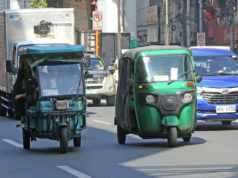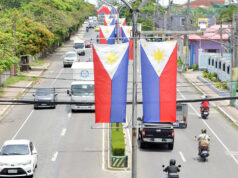Philippine opposition told to consolidate amid rift in Marcos gov’t alliance

By Kyle Aristophere T. Atienza, Reporter
NONALIGNED voters who supported opposition candidates in the 2022 elections have yet to be transformed into a solid political base even as the ruling coalition led by Philippine President Ferdinand R. Marcos, Jr. faces internal rumblings, according to political analysts.
“We have yet to see if the support base of the opposition in 2022 is still there since it has never transitioned into a working body or a real political force,” Arjan P. Aguirre, who teaches political science at the Ateneo de Manila University, said in a Facebook Messenger chat on Tuesday.
The opposition should have managed to sustain a support base that is “capable of organizing people other than those within their existing network of movements and organizations,” he added.
Mr. Marcos ran for President in 2022 under a platform of unity that in recent days has become difficult to achieve.
The Philippine leader is now being challenged by the family of Vice-President Sara Duterte-Carpio, who ran in tandem with him in the 2022 elections, after his allies in Congress stripped her of confidential funds worth P650 million in this year’s national budget.
The Marcos-Duterte quarrel is bad for the country’s investment climate, National Economic and Development Authority Secretary Arsenio S. Balisacan told a news briefing where 2023 economic output data were released.
“It’s okay to have all these exchanges and political debates,” he said in mixed English and Filipino. “That’s OK because that’s democracy. But it should not create political instability because it will affect the economy.”
Former Vice-President Maria Leonor G. Robredo, who lost to Mr. Marcos in 2022, managed to draw hundreds of thousands of crowds during her campaign. Ms. Robredo founded a nongovernment group composed of volunteers in July 2022 after her term as vice-president ended.
“There is a difference between an electoral mobilization and a political mobilization,” Mr. Aguirre said. “It’s not easy to transition from one mobilization to another. One needs to have a solid base of supporters who are always there to sustain the mobilization effort.”
On Sunday, at least two major political gatherings were held in the Philippines, one of which was an administration-led rally in Manila under the theme “Bagong Pilipinas” (New Philippines), which the President and Ms. Duterte-Carpio attended.
In Davao City in southern Philippines, ex-President Rodrigo R. Duterte and his supporters held a prayer rally where he accused Mr. Marcos of being a drug addict. His successor has shunned his key policies by standing up to China and pursuing closer security ties with the US.
The gathering that was highly critical of Mr. Marcos and his cousin Speaker Ferdinand Martin G. Romualdez, who has been linked to a so-called people’s initiative for Charter change, was also attended by Ms. Duterte-Carpio and presidential sister Senator Maria Imelda “Imee” R. Marcos.
CAMPAIGN STRATEGY
As the rift widens, opposition forces including Bagong Alyansang Makabayan (Bayan) and Akbayan Party are doubling their consolidation efforts as they plan to hold large anti-Charter change rallies next month in time for the commemoration of the popular street uprising that toppled the dictatorial regime of Mr. Marcos’s late father and namesake in February 1986.
Bayan and Akbayan have major political differences and had been political foes in the past. These political groups, which have united on key issues under the Duterte government, are opposing changes to the country’s 36-year-old Constitution.
“At present, the opposition seems to be still reeling from its major electoral losses and political bullying especially during the Duterte administration,” Mr. Aguirre said.
“They are also almost always distracted with the numerous issues that exist in society. They seem to be incapable of focusing on a single mainstream issue that is relevant to the public,” he added.
Senator Risa Hontiveros-Baraquel, the lone opposition candidate who won a Senate seat in 2022, on Monday hit the Marcos and Duterte camps for their petty quarrel.
Hansley A. Juliano, a political science lecturer at the Ateneo, said the pro-Robredo movement called Kakampink should reach out to more people, including those who had supported the Marcos-Duterte tandem.
“The continuing nostalgia consumption of the opposition remains its most persisting discourse,” he said via Messenger chat. “The opposition’s brand, as long as it’s defined by EDSA nostalgia, Aquino nostalgia, or Kakampink bitterness, will not attract votes or rebuild a genuine opposition.”
He cited the need to rebuild and recapture elements linked to other losing candidates such as former Senators Panfilo M. Lacson and Emmanuel D. Pacquiao and ex-Manila Mayor Francisco Domagoso.
“Only then can they expect to build a slate that may matter in 2025,” he said. “The snobbishness of ‘we’re clean, we’re moral, we’re better than everyone else’ as a campaign strategy has to go.”
Akbayan expects the Marcos-Duterte tension to worsen.
“We urge the public to remain steadfast in opposing all forms of Cha-cha and vigilant against any extra-constitutional schemes from the Dutertes aimed at evading accountability and usurping power,” Akbayan Party President Rafaela David said in a Messenger chat.
Mr. Juliano said if the Marcos-Duterte tension leads to a split, “it will at least make explicit to both camps how big their base really is.” “It will also make clear who the ‘left-behind camps’ (Lacson, Pacquiao and Moreno) should go to, if they were not already in UniTeam in the first place.”
Mr. Aguirre urged the opposition not just to oppose the government but also to provide “workable and practical alternative policies and programs.”
Inflation remains a key risk to Philippines economic growth and is a top concern for most Filipinos, based on previous polls. It slowed to 3.9% in December after hitting a 14-year high in January last year.
An Octa Research Group poll on Dec. 10-14 showed that 14% or 3.7 million Filipino families considered themselves poor, worse than 10% or 2.6 million families in September.



